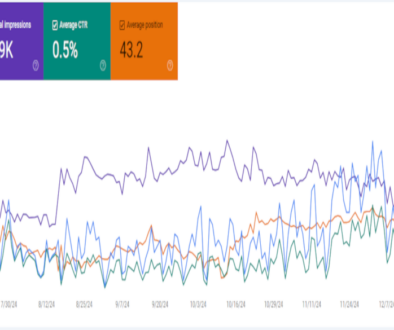Mastering Semantic SEO: The Ultimate Guide to Outrank Your Competitors
Are you struggling to push your website up in search engine rankings? One key strategy is Semantic SEO – a game-changing technique that builds more meaning into your content. This blog post will guide you through effectively implementing semantic SEO, improving visibility and driving more traffic towards your site.
Ready to unlock the secret for better rankings? Let’s dive in!
Key Takeaways
- Semantic SEO is a forward – thinking approach to optimization that focuses on building meaning into content, rather than just keyword density.
- By understanding the intent and context behind user queries, websites can improve their visibility and drive more organic traffic.
- Semantic SEO involves optimizing content around topics, entities, and facts to establish strong relationships with search engines and provide valuable information to users.
- Implementing semantic SEO techniques enhances the search experience for users by delivering more accurate and relevant results.
What is Semantic SEO?
Semantic SEO is a forward-thinking approach to optimizing your website’s content, and it involves building more meaning into the text for heightened search engine visibility. Instead of just focusing on keyword repetition or density, semantic SEO techniques hone in on the underlying intent and context of users’ queries.
This is achieved by creating comprehensive, in-depth content around topics, entities, and facts – not just stuffing articles with keywords.
This powerful strategy evolves from semantic search – an advanced method employed by search engines like Google where they focus on determining the user’s intent and the contextual meaning of words used in a query rather than simply matching keywords verbatim.
Hence, understanding semantics in SEO can greatly improve a site’s success rate in driving organic traffic as well as ranking higher in web searches. By connecting terms, entities, and facts within factual accuracy and relational relevance parameters, your website becomes easily discoverable by users seeking specific information relevant to your niche expertise.
It’s essentially speaking Google’s language while providing real value to human readers simultaneously.
The Basics of Search Engine Optimization (SEO)
Search Engine Optimization (SEO) is a fundamental pillar for any website aiming to gain visibility on the digital landscape. In simple terms, it’s the process of tailoring your website’s content and design in such a way that search engines deem it helpful and relevant for users.
Think of Google or any other search engines like detectives. They’re always probing websites to understand what they’re about, how reliable they are, and whether or not they provide value to their users.
SEO is all about making sure these sleuths find exactly what they’re looking for when they visit your site. It involves optimizing web elements like meta tags, HTML code structure, keyword usage, backlinks from reputable sources and developing high-quality content that resonates with your audience.
Most importantly — SEO isn’t just about appealing to algorithms but people too. It isn’t solely focused on getting you at the top of search engine results pages (SERPs). Rather it’s also keenly designed around enhancing user experience so visitors stick around longer on your site leading to higher chances of conversions—an essential metric every website owner should keep an eye on!
Through smart use of Semantic SEO techniques—optimizing content around topics/entities rather than keywords—you can improve a website’s ability to rank well in SERPs while boosting overall user engagement significantly—a win-win situation by all means!
SEO Fundamentals that Move the Needle
In order to effectively leverage the power of semantic SEO, you need to have a firm grasp on some fundamental aspects of search engine optimization. They can significantly improve your website’s ranking in search engine results:
- Understand User Intent: Google aims to provide the most relevant answer to a user’s query. Know your target audience and their search behavior in order to add more context and meaning into your content.
- Comprehensive Keyword Research: Keywords aren’t everything in SEO, but they still hold importance. Conduct thorough keyword research not just for highly competitive terms but also for related keywords, phrases, or questions that users might type into search bars.
- Create In-depth Content: In-depth, useful content is the backbone of SEO. Create comprehensive articles that address user queries and offer valuable insights.
- Master On-page SEO: On-page SEO refers to optimizing individual webpages so that they rank higher on search engines and earn more relevant traffic. This includes creating high-quality content, optimizing title tags, using header tags appropriately and ensuring fast load times.
- Understand Semantic Search: With semantic search, search engines are better at understanding natural language, contextual meaning of words and user intent.
- Implement Semantic On-Page Optimization: By aligning your on-page elements like title tags, meta description with semantic SEO tactics, you can rank for a wider range of keywords.
- Use Semantic SEO Techniques: These techniques involve building more facts into your web content so as to establish strong relationships between entities in accordance with factual accuracy and relational relevance.
The Relationship Between Semantic SEO and Search Engines
Semantic SEO and search engines have a symbiotic relationship that significantly impacts website rankings. Semantic SEO focuses on understanding the meaning and context behind search queries, which allows search engines to deliver more accurate and relevant results to users.
By optimizing content around topics, entities, and facts rather than just keywords, semantic SEO helps websites establish meaningful connections with search engines.
Google’s algorithm has evolved over time to prioritize semantic search, aiming to understand user intent and provide the most comprehensive answers. This shift means that simply stuffing content with keywords is no longer enough to rank well in search engine results.
Instead, website owners need to focus on creating high-quality content that covers a topic in-depth and addresses user needs.
With semantic SEO strategies in place, websites can improve their ability to rank well in search engine results by connecting terms, entities, and facts within factual accuracy and relational relevance.
By aligning their content with what users are searching for based on intent rather than just specific phrases or words, website owners can enhance their visibility among potential visitors.
Implementing semantic SEO techniques requires an understanding of how people search for information online and leveraging tools specifically designed for this purpose. By embracing the power of semantics in SEO practices, website owners can unlock better rankings on Google while providing a more satisfying experience for users seeking valuable information.
How Semantic SEO Improves the Search Experience
Semantic SEO plays a crucial role in enhancing the search experience for users. By focusing on understanding the meaning and context behind search queries, semantic SEO ensures that search engines deliver more accurate and relevant results to users.
This means that when someone searches for something specific, they are more likely to find exactly what they’re looking for.
One way semantic SEO achieves this is by optimizing content around topics, entities, and facts rather than just keywords. This allows search engines to better understand the intent of a user’s query and match it with content that provides comprehensive and valuable information.
As a result, users can find answers quickly and easily without having to sift through irrelevant or outdated results.
Another benefit of semantic SEO is its ability to improve user engagement on websites. When content is optimized using semantic techniques, it becomes more informative, engaging, and easy to read.
This not only helps keep visitors on your site longer but also encourages them to explore further or take desired actions such as subscribing or making a purchase.
Overall, implementing semantic SEO strategies can greatly enhance the search experience for users by providing them with more meaningful connections between their queries and relevant content.
By optimizing your website using these techniques, you can ensure that your target audience finds what they need quickly while also improving your rankings in search engine results pages (SERPs).
Benefits of Semantic SEO
Semantic SEO offers several benefits that can greatly improve your website’s rankings and overall online presence:
- Enhanced search visibility: By optimizing your content for semantics, you increase the chances of your website appearing in relevant search results. This means more exposure for your brand and increased organic traffic.
- Improved user experience: Semantic SEO helps search engines understand the intent behind a user’s search query, resulting in more accurate and relevant search results. This ultimately leads to a better user experience as visitors are more likely to find what they’re looking for on your site.
- Increased click-through rates (CTR): When your website appears prominently in search results with rich snippets and knowledge panels, it stands out from the competition. This can entice users to click on your link, thereby boosting your CTR.
- Higher conversion rates: By providing users with the most relevant and accurate information, semantic SEO helps build trust and credibility with potential customers. This can lead to higher conversion rates as visitors are more likely to engage with your content or make a purchase.
- Long-term sustainability: Unlike traditional keyword-based SEO, which can be influenced by changes in ranking algorithms, semantic SEO focuses on creating quality content that meets user needs. By prioritizing relevance and value, you can future-proof your website against algorithm updates.
- Competitive advantage: Implementing semantic SEO techniques gives you an edge over competitors who may still rely solely on keyword optimization. It allows you to target long-tail keywords and niche topics that align with user intent, making it easier to rank higher for specific queries.
- Better understanding of customer behavior: Semantic SEO involves analyzing user data and search patterns to uncover insights about customer behavior. This information can help inform marketing strategies, improve targeting, and identify new opportunities for growth.
Unlocking the Secret to Higher Rankings: The Power of Entity SEO Explained
Entity SEO is a powerful technique that can significantly improve your website’s rankings in search engines. By focusing on optimizing content around entities, which are specific people, places, things, or concepts, you can provide search engines with the contextual information they need to understand the meaning behind a user’s query.
This approach goes beyond traditional keyword-based optimization and instead focuses on delivering relevant and accurate results.
Implementing entity SEO involves connecting terms, entities, and facts within your content in a way that demonstrates factual accuracy and relational relevance. By doing so, you not only enhance the visibility of your website in search engine results but also improve the overall user experience by providing informative and meaningful content.
To unlock the power of entity SEO for higher rankings, it’s crucial to start by conducting comprehensive keyword research to identify the entities that are most relevant to your industry or niche.
Once you have identified these entities, develop high-quality content that explores them in-depth while providing valuable information to users.
By understanding and implementing entity SEO strategies effectively, you can position yourself as an authoritative source within your field while improving your website’s visibility in search engine rankings.
As algorithms continue to evolve towards semantic understanding of queries rather than just keywords alone, incorporating entity SEO into your overall optimization strategy is essential for staying ahead of the competition.
Semantic SEO Strategies for Higher Rankings
Semantic SEO strategies play a crucial role in improving your website’s ranking on search engines. By focusing on building more meaning into your content, you can enhance your chances of appearing higher in search results. Here are some effective semantic SEO strategies you can implement:
- Identify and target user intent: Understand what users are looking for when they search for specific topics related to your website. This will help you tailor your content to meet their needs and increase relevancy.
- Perform comprehensive keyword research: Instead of relying solely on traditional keyword optimization, dig deeper into the semantics behind those keywords. Look for related terms, synonyms, and variations that expand the context of your content.
- Create in-depth and authoritative content: Search engines value high-quality, well-researched content that provides valuable information to users. Aim to create comprehensive and authoritative articles that cover a topic in detail.
- Optimize on-page elements: Pay attention to optimizing elements such as titles, headings, meta descriptions, and URLs with relevant keywords and entities. This helps search engines understand the context of your content.
- Leverage structured data markup: Implement structured data markup using Schema.org or other appropriate schemas to provide search engines with additional information about your content. This can improve visibility in rich snippets, knowledge graphs, and other enhanced search results.
- Use natural language: Write in a conversational tone using natural language that matches how people ask questions or search for information online. Natural language processing algorithms are becoming increasingly sophisticated at understanding context and intent.
- Promote engagement signals: Encourage user engagement by providing interactive elements like videos, infographics, surveys, or quizzes within your content. Engagement signals like dwell time, social sharing, and comments can positively impact rankings.
- Build relationships with authority websites: Develop relationships with influential websites in your industry through guest blogging or collaborative efforts. Getting backlinks from trusted domains can enhance the credibility of your website.
- Stay updated with algorithm changes: Keep up with the latest algorithm updates from search engines like Google. By staying informed, you can adapt your semantic SEO strategies to align with the current ranking factors.
Optimizing Content for Semantic SEO
When optimizing your content for Semantic SEO, consider the following strategies:
- Conduct comprehensive keyword research to identify relevant topics and entities to focus on.
- Create high-quality, in-depth content that provides valuable information on the chosen topics and entities.
- Use structured data markup to provide search engines with more context about your content.
- Incorporate natural language and user-friendly content, avoiding keyword stuffing or over-optimization.
- Focus on providing accurate and factual information within your content to enhance relevance and authority.
- Utilize header tags (H1, H2, etc.) to structure your content and highlight important sections.
- Include relevant synonyms and related terms throughout your content to establish a wider semantic footprint.
- Optimize meta tags, such as title tags and meta descriptions, using keywords related to your targeted topics and entities.
- Ensure your website has a clear site structure with intuitive navigation for both users and search engines.
- Regularly update and expand your content to keep it fresh and relevant.
The Role of Context in Semantic SEO
Context plays a crucial role in semantic SEO. When it comes to optimizing your website for better rankings, understanding the context behind search queries is essential. Context refers to the specific circumstances and information surrounding a query or topic.
By considering the context, search engines can provide more accurate and relevant results to users. For example, if someone searches for “apple,” search engines need to determine whether they are looking for information about the fruit or the technology company.
When implementing semantic SEO strategies, website owners should focus on creating content that aligns with user intent and provides comprehensive information related to the topic. By analyzing user behavior and search patterns, you can better understand what people are looking for when they make certain queries.
Moreover, incorporating contextual signals such as location, device type, language preferences, and previous search history can also improve how your website ranks in search engine results. This means taking into account factors like geographical relevance or tailoring content specifically for mobile users.
Ultimately, by paying attention to context in semantic SEO efforts, you can enhance your website’s visibility and attract more targeted organic traffic from users who are genuinely interested in what you have to offer.
The Future of Semantic SEO
As we look ahead to the future of SEO, one thing is clear: semantic SEO is here to stay. With search engines becoming smarter and more sophisticated, it’s crucial for website owners to embrace this approach in order to stay competitive.
Semantic SEO goes beyond just optimizing content for keywords. It focuses on understanding the meaning behind search queries and delivering relevant results based on user intent. This means that website owners need to shift their focus from individual keywords to topics, entities, and facts.
In the coming years, we can expect even more advancements in semantic search technology. Search engines will continue to refine their algorithms and place greater emphasis on context and relevance.
As a result, websites that are able to provide comprehensive and accurate information around specific topics will be rewarded with higher rankings.
To prepare for the future of semantic SEO, website owners should invest in tools and courses that specifically target this area of optimization. By staying up-to-date with the latest trends and strategies, businesses can ensure they remain visible in search engine results pages (SERPs) and attract valuable organic traffic.
In conclusion, embracing semantic SEO is essential for website owners who want to thrive in today’s digital landscape. By focusing on building meaningful connections through optimized content, businesses can improve their rankings in search engines like Google while providing a better experience for users seeking relevant information online.
Conclusion
In conclusion, embracing the power of semantic SEO is the key to unlocking meaningful connections for better rankings. By optimizing our content around topics, entities, and facts rather than keywords alone, we can enhance the search experience for users and improve our website’s visibility in search engine results.
With semantic SEO techniques at our disposal, we have the potential to revolutionize our online presence and rise above the competition. So let’s dive into this evolving field of SEO semantics and start reaping the benefits it has to offer.
FAQs
1. What is semantic SEO and how does it improve rankings?
Semantic SEO is an approach to search engine optimization that focuses on understanding the context and meaning behind search queries in order to deliver more relevant results. By incorporating related terms, concepts, and synonyms into your content, you can establish meaningful connections with search engines and improve your rankings.
2. How can I implement semantic SEO on my website?
To implement semantic SEO on your website, start by conducting keyword research to identify relevant topics and related terms for your target audience. Then, create high-quality content that incorporates these keywords naturally throughout the text. You can also use structured data markup to provide additional context to search engines about the information on your pages.
3. Does semantic SEO only focus on keywords?
No, semantic SEO goes beyond traditional keyword optimization. While keywords are still important, semantic SEO emphasizes understanding user intent behind search queries and providing comprehensive answers or solutions through well-structured content that covers various aspects of a topic in depth.
4. Can semantic SEO help my website rank higher for voice searches?
Yes, implementing semantic SEO strategies can improve your chances of ranking higher for voice searches. Voice assistants often prioritize delivering direct answers or snippets from websites that provide clear and concise information related to a user’s query. By optimizing your content using structured data markup and targeting long-tail conversational keywords, you increase the likelihood of being featured as a top result in voice searches.
General Facts
- Semantic SEO focuses on building more meaning into web content to improve rankings in search engines like Google.
- Semantic SEO strategies can be implemented to rank higher in Google search results.
- Semantic SEO is a technique that optimizes content around topics, entities, and facts rather than keywords.
- User intent, comprehensive keyword research, and creating in-depth content are key aspects of using semantic SEO for better rankings.
- Semantic search is a powerful tool that helps users find information quickly and accurately.
- Understanding semantics in SEO can improve a website’s ability to rank well in search engine results and drive more traffic.
- Semantic SEO techniques focus on understanding the meaning and context behind search queries.
- Semantic SEO involves connecting terms, entities, and facts within a factual accuracy and relational relevance.
- Semantic SEO strategies can be implemented using tools and courses specifically designed for this purpose.
- Semantic search is considered to be better than traditional keyword-based search.
Source URLs
www.searchenginejournal.com/content-semantic-seo/201596/
www.higglo.io/post/mastering-semantic-seo-advanced



